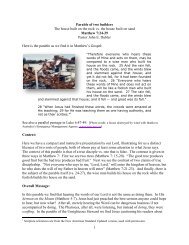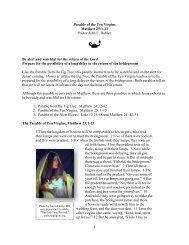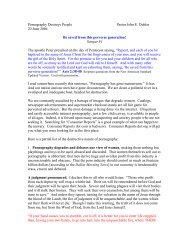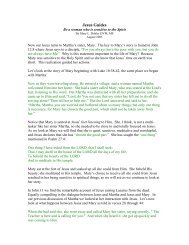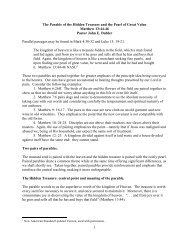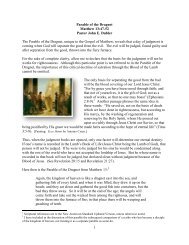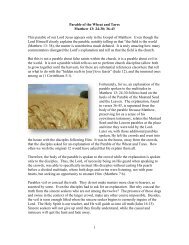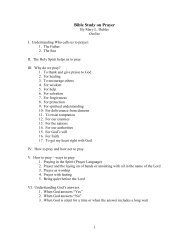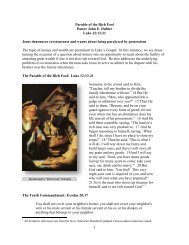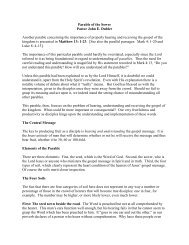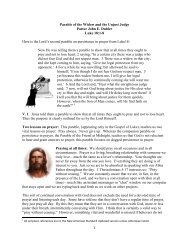1 A time to be born, a time to die Pastor John E. Dubler Ecclesiastes 3
1 A time to be born, a time to die Pastor John E. Dubler Ecclesiastes 3
1 A time to be born, a time to die Pastor John E. Dubler Ecclesiastes 3
Create successful ePaper yourself
Turn your PDF publications into a flip-book with our unique Google optimized e-Paper software.
A <strong>time</strong> <strong>to</strong> <strong>be</strong> <strong>born</strong>, a <strong>time</strong> <strong>to</strong> <strong>die</strong><br />
Pas<strong>to</strong>r <strong>John</strong> E. <strong>Dubler</strong><br />
<strong>Ecclesiastes</strong> 3: 1-8<br />
Our desire is <strong>to</strong> live honorably each and every day of<br />
our lives by the grace of our Lord Jesus Christ. Let us<br />
not, in the last day of our lives, end them dishonorably<br />
through suicide and thus leave a legacy of pain <strong>to</strong> our<br />
children and grandchildren.<br />
Ageing population has forwarded the debate about the “Right <strong>to</strong> <strong>die</strong>.”<br />
As our population ages, the desire for people <strong>to</strong> choose the <strong>time</strong> and method of their own death is<br />
increasing. What was once considered “unthinkable” is now <strong>be</strong>ing permitted and even<br />
legislatively protected. Physicians, who are charged by the Oath of Hippocrates, are now<br />
violating that oath when they prescri<strong>be</strong> a combination of drugs <strong>to</strong> bring about death or assist in a<br />
suicide.<br />
God’s fundamental answer: He alone chooses the date of birth and death.<br />
We should <strong>be</strong> aware that our days are num<strong>be</strong>red.<br />
Psalm 90:12<br />
“So teach us <strong>to</strong> num<strong>be</strong>r our days,<br />
That we may present <strong>to</strong> You a heart of wisdom.”<br />
A specific num<strong>be</strong>r of days have <strong>be</strong>en ordained for you.<br />
God already determined the day you were <strong>to</strong> <strong>be</strong> <strong>born</strong>.<br />
Psalm 139:15-16<br />
15 My frame was not hidden from You,<br />
When I was made in secret,<br />
And skillfully wrought in the depths of the earth;<br />
16 Your eyes have seen my unformed substance;<br />
And in Your book were all written<br />
The days that were ordained for me,<br />
When as yet there was not one of them.<br />
1
God determines the day you will <strong>die</strong>.<br />
<strong>Ecclesiastes</strong> 3:1-2<br />
There is an appointed <strong>time</strong> for everything.<br />
And there is a <strong>time</strong> for every event under heaven —<br />
A <strong>time</strong> <strong>to</strong> give birth and a <strong>time</strong> <strong>to</strong> <strong>die</strong> . . .<br />
Don’t take matters in<strong>to</strong> your own hands. Taking matters in<strong>to</strong> our own hands concerning our<br />
<strong>time</strong> <strong>to</strong> <strong>die</strong> is willful folly, resulting in consequences which end the reign of nations and destroy<br />
the fabric of societies.<br />
The right <strong>to</strong> choose<br />
As with the debate about abortion, the problem with euthanasia has come <strong>to</strong> the fore <strong>be</strong>cause of<br />
assumed, or so called “rights.” The argument has <strong>be</strong>en framed as a “right <strong>to</strong> choose.”<br />
o It’s my body; I have a right <strong>to</strong> do as I wish.<br />
o Don’t tell me how <strong>to</strong> live my life or when I can <strong>die</strong>.<br />
Choices and consequences. We do have the capacity <strong>to</strong> choose in certain fundamental<br />
situations, such as: “Where will I go <strong>to</strong> work” “Where will I go <strong>to</strong> school” “What will I eat,<br />
what will I wear, where will I live, etc.” But even those decisions do not imply a complete<br />
divorce <strong>be</strong>tween our ability <strong>to</strong> make a decision and a Holy and Sovereign God <strong>to</strong> whom we all<br />
owe o<strong>be</strong><strong>die</strong>nce. In addition, all decisions carry with them a cloud of consequences, for good or<br />
bad. Some of the consequences are unseen and unanticipated, simply<br />
<strong>be</strong>cause finite man cannot understand in advance everything that will take<br />
place in the future.<br />
Suicide, whether physician assisted or not, is murder<br />
Suicide is self-murder. Anyone who assists in suicide may <strong>be</strong> exempted<br />
by law of the land from <strong>be</strong>ing charged with murder, but in the eyes of<br />
God, he or she has assisted in murder.<br />
Scripture and suicide. There is only one example in scripture of a person <strong>be</strong>ing asked <strong>to</strong> assist<br />
with a suicide. King Saul, mortally wounded in battle, found himself suffering greatly and about<br />
<strong>to</strong> <strong>be</strong> overrun by the Philistines. He asked his armor <strong>be</strong>arer <strong>to</strong> kill him, but the armor <strong>be</strong>arer<br />
would not do it. So Saul, in an attempt <strong>to</strong> commit suicide, fell on his own sword. His armor<br />
<strong>be</strong>arer also fell on his sword, as a misdirected act of loyalty <strong>to</strong>ward Saul. Saul was not<br />
successful, and his life lingered. At Saul’s own request an Amalekite, a foreigner, not in the<br />
army of Israel, killed Saul. Read the account in 2 Samuel 1: 1-16.<br />
Suicide is expressly forbidden in the Bible. 1 Corinthians 3:16-17 makes the case completely<br />
clear: “Do you not know that you are a temple of God, and that the Spirit of God dwells in you<br />
If any man destroys the temple of God, God will destroy him, for the temple of God is holy and<br />
2
that is what you are.” Suicide is “destroying the temple of God.” Our bo<strong>die</strong>s as temples are holy<br />
ground, not <strong>to</strong> <strong>be</strong> trampled upon by man, nor life extinguished by homicide or suicide.<br />
Your body, in fact, is not your own. As a <strong>be</strong>liever you have <strong>be</strong>en “bought with a price,” 1 and<br />
therefore you cannot simply make any decision you like in regard <strong>to</strong> your body. We are <strong>to</strong> <strong>be</strong><br />
good stewards of our bo<strong>die</strong>s just as we are <strong>to</strong> <strong>be</strong> with anything else given under our control, from<br />
family <strong>to</strong> finances and even <strong>to</strong> our very bo<strong>die</strong>s themselves.<br />
People are afraid of suffering and pain<br />
Time and again when I have asked people if they are afraid of death I<br />
hear, “No, but I do fear the process of dying.” Only one person has<br />
<strong>to</strong>ld me they were actually afraid of death. More should <strong>be</strong> afraid of<br />
death, <strong>be</strong>cause if a person does not know Jesus Christ as Savior and<br />
Lord of his life, when he <strong>die</strong>s he will go <strong>to</strong> hell and <strong>be</strong> <strong>to</strong>rmented there<br />
throughout eternity. There will <strong>be</strong> no second chance.<br />
However, people, almost universally, are fearful of suffering. Perhaps<br />
they have visited a nursing home or seen a relative <strong>die</strong> in some<br />
protracted health struggle. They come <strong>to</strong> the conclusion that they must<br />
do something <strong>to</strong> prevent such suffering when their <strong>time</strong> comes. They<br />
have either forgotten or never knew that God has promised never <strong>to</strong><br />
leave us or forsake us, even at the end of life and in the dying process<br />
itself.<br />
Deuteronomy 31: 6-8 “Be strong and courageous, do not <strong>be</strong> afraid or tremble,<br />
. . . for the Lord your God is the one who goes with you. He will not fail you<br />
or forsake you . . .”<br />
Romans 8: 35-39 tells us that we shall never <strong>be</strong> separated from the love of<br />
Christ.<br />
In Psalm 23 we read, “Yea, though I walk through the valley of the shadow of<br />
death, I will fear no evil for Thou art with me . . .”<br />
Christ’s power is perfected in weakness<br />
We must constantly remind ourselves of this truth: “When I am weak, then I am strong.” Paul<br />
sought the Lord in prayer three <strong>time</strong>s that his “thorn in the flesh” would <strong>be</strong> removed from him.<br />
This, I <strong>be</strong>lieve, was some sort of physical affliction, most likely a problem with his eyes. This<br />
weakness kept him from exalting himself. He had received a direct revelation of heaven and<br />
could have easily <strong>be</strong>come puffed up.<br />
1 1 Corinthians 6:20<br />
3
Whether a problem with eyes or not, Scripture shows us that Paul had some kind of physical<br />
infirmity.<br />
Galatians 4:13-15 recounts: “But you know that it was <strong>be</strong>cause of a bodily<br />
illness that I preached the gospel <strong>to</strong> you the first <strong>time</strong>; and that which was a<br />
trial <strong>to</strong> you in my bodily condition you did not despise or loathe, but you<br />
received me as an angel of God, as Christ Jesus Himself. Where then is that<br />
sense of blessing you had For I <strong>be</strong>ar you witness that, if possible, you would<br />
have plucked out your eyes and given them <strong>to</strong> me.”<br />
The Bible tells us how <strong>to</strong> view weaknesses<br />
Here is Paul’s account of what happened when he asked the Lord <strong>to</strong> remove the weakness he was<br />
experiencing.<br />
2 Corinthians 12:7-10 Because of the surpassing greatness of the revelations,<br />
for this reason, <strong>to</strong> keep me from exalting myself, there was given me a thorn in<br />
the flesh, a messenger of Satan <strong>to</strong> <strong>to</strong>rment me — <strong>to</strong> keep me from exalting<br />
myself! 8 Concerning this I implored the Lord three <strong>time</strong>s that it might leave<br />
me. 9 And He has said <strong>to</strong> me, "My grace is sufficient for you, for power is<br />
perfected in weakness." Most gladly, therefore, I will rather boast about my<br />
weaknesses, so that the power of Christ may dwell in me. 10 Therefore I am<br />
well content with weaknesses, with insults, with distresses, with persecutions,<br />
with difficulties, for Christ's sake; for when I am weak, then I am strong.<br />
Pray for healing, pray for strength, and <strong>be</strong> ready for suffering<br />
We are certainly <strong>to</strong> pray and ask God <strong>to</strong> heal all our<br />
weaknesses. Moses <strong>die</strong>d at the age of 120, and yet the<br />
Bible records that his eye was not dim and his physical<br />
strength was not abated. I encourage us all <strong>to</strong> pray and<br />
have faith that the Lord will heal all our infirmities and all<br />
our diseases. This message is not about healing, but the<br />
great sin of suicide, so I will not focus on the aspect of<br />
healing but rather knowing how <strong>to</strong> handle suffering.<br />
Paul, in the midst of suffering would pray for strength from<br />
the Lord. In a familiar and often quoted verse he says, “I<br />
can do all things through Him who strengthens me.”<br />
Philippians 4:11-14 Not that I speak from want,<br />
for I have learned <strong>to</strong> <strong>be</strong> content in whatever<br />
circumstances I am. I know how <strong>to</strong> get along with<br />
humble means, and I also know how <strong>to</strong> live in<br />
prosperity; in any and every circumstance I have learned the secret of <strong>be</strong>ing<br />
filled and going hungry, both of having abundance and suffering need. I can<br />
Moses lived <strong>to</strong> the age of 120 and was<br />
strong until the day of his death<br />
4
do all things through Him who strengthens me. Nevertheless, you have done<br />
well <strong>to</strong> share with me in my affliction.<br />
Suffering is, of course, not a popular <strong>to</strong>pic. But the<br />
pas<strong>to</strong>r who does not prepare his flock for suffering is<br />
not preaching the full gospel. Job experienced much<br />
pain and suffering, yet “In all these things Job did not<br />
sin nor blame God.” (Job 1:22). I am concerned that if<br />
many of us suffer we would not <strong>be</strong> able <strong>to</strong> say the same<br />
thing as did Job. When he was challenged by his wife<br />
who said, “Curse God and <strong>die</strong>,” he responded, “Shall<br />
we indeed accept good from God and not accept<br />
adversity” (Job 2:10).<br />
The spiritual value of suffering<br />
I do not speak of suffering as a consequence of doing wrong. There is no value in that. 1 Peter<br />
4:15-16 tells us, “Make sure that none of you suffers as a murderer, or thief, or evildoer, or a<br />
troublesome meddler; but if anyone suffers as a Christian, he is not <strong>to</strong> <strong>be</strong> ashamed, but is <strong>to</strong><br />
glorify God in this name.”<br />
The fellowship of suffering saints<br />
There is a fellowship in the sufferings of Christ which we may experience, and if so, we will<br />
share in His glory. Consider Philippians 3:10: “That I may know Him, and the power of His<br />
resurrection and the fellowship of His suffering, <strong>be</strong>ing conformed <strong>to</strong> His death; in order that I<br />
may attain <strong>to</strong> the resurrection from the dead.”<br />
And again, the one of the greatest chapters on suffering, 2 Corinthians 4 tells us: “But we have<br />
this treasure in earthen vessels, that the surpassing<br />
greatness of the power may <strong>be</strong> of God and not from<br />
ourselves” (2 Corinthians 4:7).<br />
It is not completely clear <strong>to</strong> me, but I know that people<br />
who suffer and offer that suffering <strong>to</strong> the Lord Jesus as a<br />
kind prayer, find themselves in closer fellowship with<br />
Jesus and with other sufferers as well. No one<br />
understands a sufferer as well as another who has<br />
suffered the same kind of pain. For this reason nobody<br />
understands the sufferer like Jesus, who suffered such<br />
cruel <strong>to</strong>rture and crucifixion for our sake, though we were<br />
the guilty ones and He the innocent one.<br />
Because Jesus knows first-hand the nature of our trials<br />
and sufferings, the scriptures tell us that we have in Him<br />
5
a completely faithful and understanding High Priest. Hebrews 4:15-16 relates:<br />
For we do not have a high priest who cannot sympathize with our weaknesses,<br />
but One who has <strong>be</strong>en tempted in all things as we are, yet without sin.<br />
Therefore let us draw near with confidence <strong>to</strong> the throne of grace, so that we<br />
may receive mercy and find grace <strong>to</strong> help in <strong>time</strong> of need.<br />
Refusing medical technology for the terminally ill 2<br />
There comes a <strong>time</strong> for each of us when death is completely natural and<br />
the “<strong>time</strong> <strong>to</strong> <strong>die</strong>” has arrived. Medical technology should not <strong>be</strong><br />
expected or called upon <strong>to</strong> extend that day or prolong the process.<br />
Trying <strong>to</strong> extend life <strong>be</strong>yond the natural and expected <strong>time</strong> of death for<br />
the terminally ill is not necessary and indeed not appropriate.<br />
Therefore, use of ventila<strong>to</strong>rs, respira<strong>to</strong>rs, kidney dialysis, and<br />
chemotherapy merely <strong>to</strong> keep a person alive, where that terminally ill<br />
person has no hope of living without the aid of those machines or<br />
therapies, is not appropriate. In such a case, nature and God’s timing<br />
for the day of death should <strong>be</strong> allowed <strong>to</strong> take its course.<br />
Great care must <strong>be</strong> exercised in making the determination that the “<strong>time</strong> <strong>to</strong> <strong>die</strong>” has come, and<br />
the use of life sustaining intervention is no longer appropriate. 3 For this reason, a properly<br />
executed durable power of at<strong>to</strong>rney for health care decisions in case a person is incapacitated, is<br />
a good idea. (For further information on a durable power of at<strong>to</strong>rney, see the end section of this<br />
message.)<br />
Use of respira<strong>to</strong>rs or ventila<strong>to</strong>rs is entirely appropriate in the case of an individual who is not<br />
terminally ill or disabled, as a means of giving the body a chance <strong>to</strong> recoup strength and wellness<br />
after a severe accident or illness.<br />
Medically assisted nutrition and hydration is appropriate for every person, young and old,<br />
throughout every day of his life, under any and every circumstance. Even if the person is<br />
unconscious, giving nutrition and hydration should <strong>be</strong> considered a normal provision of decent<br />
personal care and certainly not an artificial medical extension of life.<br />
Hospice and the end of life:<br />
Although not all Hospice chapters have the same philosophy, Hospice of Larimer County is Pro<br />
Life. This means they take special care <strong>to</strong> help patients with difficult-<strong>to</strong>-manage symp<strong>to</strong>ms, such<br />
as overwhelming pain.<br />
2 Terminally ill is defined as: An irreversible and fatal disease, illness or condition. Although a patient may <strong>be</strong><br />
diagnosed with a terminal condition and live for some <strong>time</strong>, this term generally refers <strong>to</strong> cases where the underlying<br />
cause of death cannot <strong>be</strong> reversed by medical technology and death is likely within six months, regardless of<br />
treatment or intervention. (C.G. Earll, Center for Bioethics and Human Dignity).<br />
3 Please note that this information is provided as a matter of ethical concern, and is not intended <strong>to</strong> <strong>be</strong> a substitute for<br />
competent medical and legal advice which may <strong>be</strong> provided by Christian medical and legal resources.<br />
6
o They do not hasten the day of death<br />
o Death is brought about as a result of the disease process<br />
o Proper administration of palliative drugs, including morphine, will make it<br />
possible for people in the end stage of life <strong>to</strong> both receive and give ministry <strong>to</strong><br />
friends and loved ones almost <strong>to</strong> the very end.<br />
NOTE: This message was presented at Good Shepherd Bible Chapel with additional information<br />
on the durable power of at<strong>to</strong>rney for health care decisions as well as on hospice, by professionals<br />
in the field. To hear their comments go <strong>to</strong> www.johndubler.com and click on “Audio Sermons.”<br />
Select the message “A Time <strong>to</strong> Die.”<br />
For more information<br />
Carrie Gordon Earll, Senior Policy Analyst for Bioethics at Focus on the Family and a fellow<br />
with the Center for Bioethics and Human Dignity has written a short article that is worth reading.<br />
Go <strong>to</strong> http://www.family.org/socialissues/Sanctity/ for information on euthanasia and medical<br />
directives such as living wills (which are not recommended) and durable powers of at<strong>to</strong>rney,<br />
(which are). Earll has also written “Making Medical Decisions for a Loved One: A Caregiver's<br />
Guide,” which can <strong>be</strong> viewed at http://www.citizenlink.org/FOSI/bioethics/A000002289.cfm.<br />
7



